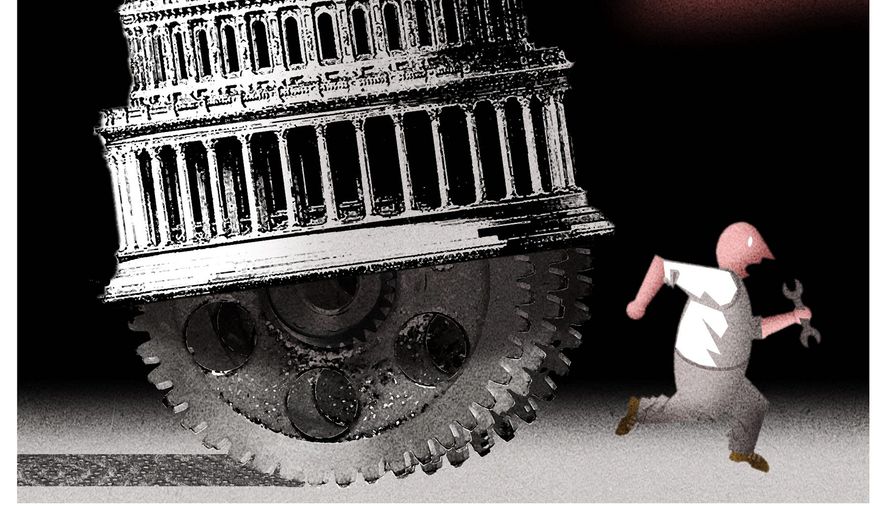OPINION:
My father Chris started his business, ATM Detailing, when I was very little. As I grew, so did the business. It was a staple of my childhood, where my dad was able to teach me skills in entrepreneurship, accounting and business. In high school, it was my part-time job. I cleaned ATMs and removed oil stains in the teller lanes of bank branches. It was dirty work, but I could set my own hours, which I would brag about to my friends working in fast food. I was my own boss.
Fast forward 10 years — my dad’s business, along with millions of others, are under threat from Congress and the PRO Act. This “pro-labor” bill is anything but pro-labor. In fact, it sacrifices independent contractors, freelancers and the small businesses that rely on them in the name of protecting organized labor from “greedy” corporate America. The PRO Act passed the House in March and is now waiting for Senate deliberations. But if the Senate is wise, it’ll kill this bill where it stands.
My family is particularly concerned with one piece of the bill that states that an employee can only be considered an independent contractor if “the service is performed outside the usual course of the business of the employer.” By that standard, none of the workers my family hires would qualify as independent contractors because their work cleaning ATMs is a part of the usual course of business. In order to keep them on, they’d all have to be regarded as regular employees.
Why’s that a problem? Just ask my dad.
The cost of having everyone as an employee is far outside of his margin. He’ll be on the hook to pay payroll taxes, 401k matching contributions, and to buy new trucks and equipment. What’s more, his own insurance costs would skyrocket since ATM Detailing consists of 19 contractors scattered across the Midwest, working just a few hours a week. If my dad is required to follow new regulations and pay the taxes, he’ll only be able to keep two employees on as full-time workers. And those two workers would have quite the job on their hands. They’d essentially become travelling cleaners, roaming the Midwest to manage all the work.
That’s bad news for dad’s employees. They’re a group of people as diverse as America: new mothers who want a side-hustle, immigrants who recently became citizens, and high schoolers who just want a summer job. They value flexibility over reliability. They’re not looking for a traditional 9-to-5, just something that works with their schedule that helps them afford their car payment, make their rent or pay their mortgage.
The PRO Act will cost all but two of dad’s employees their side hustle.
So why support it? Well, backers of the legislation claim it protects workers by giving more power to unions in collective bargaining and enforcing membership, which will lead to more equitable economic outcomes. Changing the definition of a contract work opens up a whole market of contractors for unions to tap into.
Uber is a great example. Their drivers are employed as independent contractors, but California’s AB5 law (the PRO Act’s inspiration) targeted Uber and Lyft by mandating they reclassify their workers as employees and provide benefits for full-time work. It didn’t make any sense, considering most drivers are part-time and rely on the flexibility of the work. Interestingly enough, major companies Uber and Lyft successfully pushed a ballot initiative to exempt them from the law. But small businesses are still required to follow it, and they’re suffering for it. Now my dad’s company and the rest of America’s small firms are under that same threat.
It’s the same story every time. Policies like those in the PRO Act only sound like they’ll create a Utopia—until they don’t. When workers start getting laid off by employers who can’t afford to take them on full time, and when the 14% of Americans who are independent contractors are forced into unions that may not represent them, that’s when things will stop seeming so rosy. Reclassifying these Americans makes the PRO Act pro-union, not pro-labor.
The PRO Act push by unions and Democratic Congress members shows that, in the fight to protect unions and knock big corporations down, they’re willing to sacrifice America’s small firms as collateral damage. At the end of the day, the bill doesn’t give freedom to workers, it merely limits their options. If the Senate truly has the interest of workers like my dad at heart, it’ll send this bill out with the garbage and save us all a lot of trouble.
• Luke Ashton is an economics graduate student at George Mason University, focusing on entrepreneurship, health and innovative technology. You can follow him on Twitter @LiberLuke




Please read our comment policy before commenting.